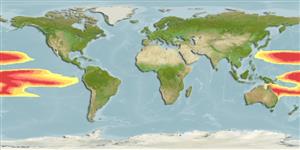>
Argentiniformes (Marine smelts) >
Opisthoproctidae (Barreleyes or spookfishes)
Etymology: Monacoa: The name constructed by Whitley was without any etymological reason; however, it is likely referring to the state of Monaco, in which the research expedition that sampled the two syntypes originated.; niger: Name from Latin 'niger' for 'black'; referring to the black streak of pigmentation present on the sole..
Environment: milieu / climate zone / depth range / distribution range
Ecologia
marinhas batipelágico; intervalo de profundidade 0 - 520 m (Ref. 111070). Deep-water
Distribuição
Países | Áreas da FAO | Ecossistemas | Ocorrências | Point map | Introduções | Faunafri
Eastern Central Pacific: off American Samoa and possibly Australia.
Tamanho / Peso / Idade
Maturity: Lm ? range ? - ? cm
Max length : 4.8 cm SL macho/indeterminado; (Ref. 111070)
Descrição suscinta
Morfologia | Morfometria
This species is distinguished by having black pigmentation along the entire sole and possibly have a darker or more blackish body color compared to congeners (scale pockets are darker); and the black streak on the sole possibly consists of distinct patches posteriorly . The holotype is slightly damaged on the sole and variation of its pigmentation pattern must be assessed with future fresh material (Ref. 111070).
Ciclo de vida ou comportamento de acasalamento
Maturidade | Reprodução | Desova | Ovos | Fecundidade | Larvas
Poulsen, J.Y., T. Sado, C. Hahn, I. Byrkjedal, M. Moku and M. Miya, 2016. Preservation obscures pelagic deep-sea fish diversity: doubling the number of sole-bearing opisthoproctids and resurrection of the genus Monacoa (Opisthoproctidae, Argentiniformes). Plos One 11(8):1-23. (Ref. 111070)
Status na Lista Vermelha da UICN (Ref. 130435)
Ameaça para os humanos
Harmless
Uso pelos humanos
Mais informação
PaísesÁreas da FAOEcossistemasOcorrênciasIntroduçõesEstoquesEcologiaDietaItens alimentaresConsumo alimentarRação
Nomes comunsSinônimosMetabolismoPredadoresEcotoxicologiaReproduçãoMaturidadeDesovaAgregação de desovaFecundidadeOvosDesenvolvimento dos ovos
Idade/TamanhoCrescimentoPeso-comprimentoComprimento-comprimentoFrequências de comprimentoMorfometriaMorfologiaLarvasDinâmica larvalRecrutamentoAbundânciaBRUVS
ReferênciasAquaculturaPerfil para aquaculturaEstirpesGenéticaElectrophoresesHereditariedadeDoençasProcessamentoNutrientsConversão de massa
ColaboradoresFotosStamps, Coins Misc.SonsCiguateraVelocidadeTipo de nataçãoÁrea branquialOtólitosCérebrosVisão
Ferramentas
Relatórios especiais
Baixar XML
Fontes da internet
Estimates based on models
Índice de diversidade filogenética (Ref.
82804): PD
50 = 0.6250 [Uniqueness, from 0.5 = low to 2.0 = high].
Bayesian length-weight: a=0.02188 (0.00844 - 0.05670), b=2.98 (2.75 - 3.21), in cm total length, based on LWR estimates for this (Sub)family-body shape (Ref.
93245).
Nível Trófico (Ref.
69278): 3.3 ±0.1 se; based on size and trophs of closest relatives
Resiliência (Ref.
120179): Elevada, tempo mínimo de duplicação da população menor que 15 meses (Preliminary K or Fecundity.).
Fishing Vulnerability (Ref.
59153): Low vulnerability (10 of 100).
